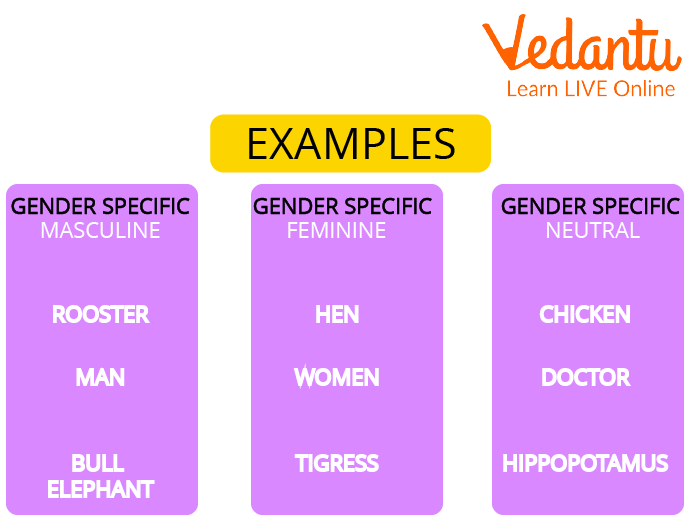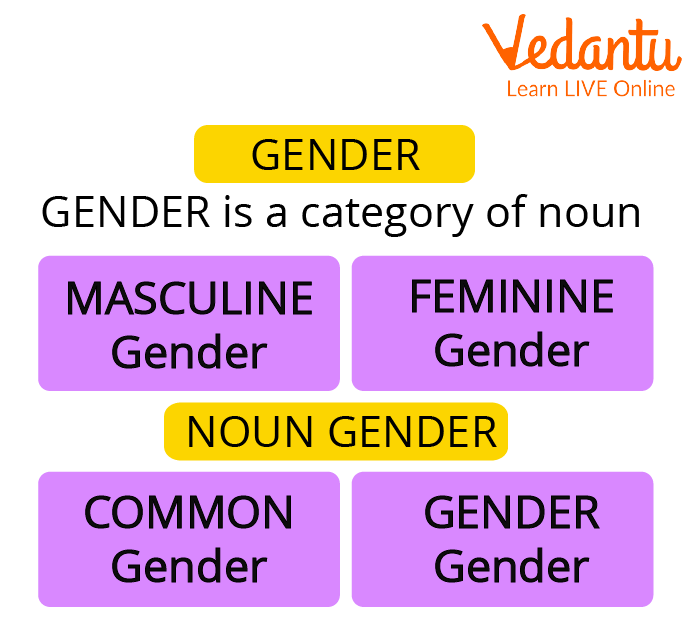Essential Guide to The Noun Gender – Class 5 CBSE English Grammar (2025-26)
FAQs on Essential Guide to The Noun Gender – Class 5 CBSE English Grammar (2025-26)
1. What are the four types of Noun Gender that are important for the Class 5 English exam as per the 2025-26 syllabus? Give one example for each.
For the Class 5 English exam, it is important to know the four types of noun gender. They are:
Masculine Gender: Refers to male characters or members of a species. For example, 'king', 'boy', 'rooster'.
Feminine Gender: Refers to female characters or members of a species. For example, 'queen', 'girl', 'hen'.
Common Gender: Refers to nouns that can be either male or female. For example, 'student', 'doctor', 'parent'.
Neuter Gender: Refers to non-living things that have no gender. For example, 'book', 'chair', 'stone'.
2. What kind of questions on identifying noun gender can be expected in the exam?
A common type of question asks students to identify and state the gender of a noun within a sentence. For example, you might be asked to 'Identify the gender of the underlined noun' in sentences like:
The policeman caught the thief. (Answer: Masculine Gender)
My teacher gave me a book. (Answer: Common Gender)
The ship sailed across the ocean. (Answer: Neuter Gender)
This tests your ability to correctly categorise nouns based on their gender.
3. Provide some important examples of changing Masculine nouns to their Feminine forms for Class 5.
Changing the gender of nouns is a frequently asked question. Here are some important masculine-to-feminine pairs you should know:
Actor → Actress
Host → Hostess
Emperor → Empress
Fox → Vixen
Stallion → Mare
Nephew → Niece
Sir → Madam
4. What is the key difference between Common Gender and Neuter Gender? This is an important concept to avoid mistakes.
The key difference is that Common Gender nouns refer to living beings that can be either male or female, while Neuter Gender nouns refer to non-living things that have no gender at all. For example:
'Friend' is Common Gender because a friend can be a boy or a girl.
'Table' is Neuter Gender because it is an inanimate object and is neither male nor female.
Mistaking one for the other is a common error in exams.
5. An important higher-order question is: Why are some non-living things (Neuter Gender) like cars or ships sometimes called 'she'?
This is a special case in English. Sometimes, we give human qualities to non-living things to show affection or a close relationship. This is called personification. For example, a captain might call his ship 'she' because he feels a personal connection to it, as in, 'She is a fine ship.' While the ship is technically of neuter gender, it is spoken of as if it were feminine.
6. How can an exam question test the use of correct pronouns for different noun genders?
Questions on pronouns test the practical application of noun gender. You might be asked to fill in the blanks or rewrite a sentence. For example:
Fill in the blank: The queen is on her throne. ___ looks majestic. (Answer: She)
Rewrite correctly: The dog wagged his tail when it saw the postman. (Answer: The dog wagged its tail when it saw the postman, as 'dog' can be common gender unless specified).
These questions check if you can link the noun to the correct pronoun (he/she/it).
7. Besides adding '-ess', what are two other important rules for forming feminine nouns that often appear in questions?
While adding '-ess' is common, examiners often test other important rules for forming feminine nouns. Two such rules are:
Using a completely different word: Some masculine nouns have entirely different words for their feminine forms, which must be memorised. For example, Horse (stallion) → Mare, King → Queen, Monk → Nun.
Changing part of a compound word: For compound nouns, the masculine or feminine part is changed. For example, Landlord → Landlady, Grandfather → Grandmother.



























